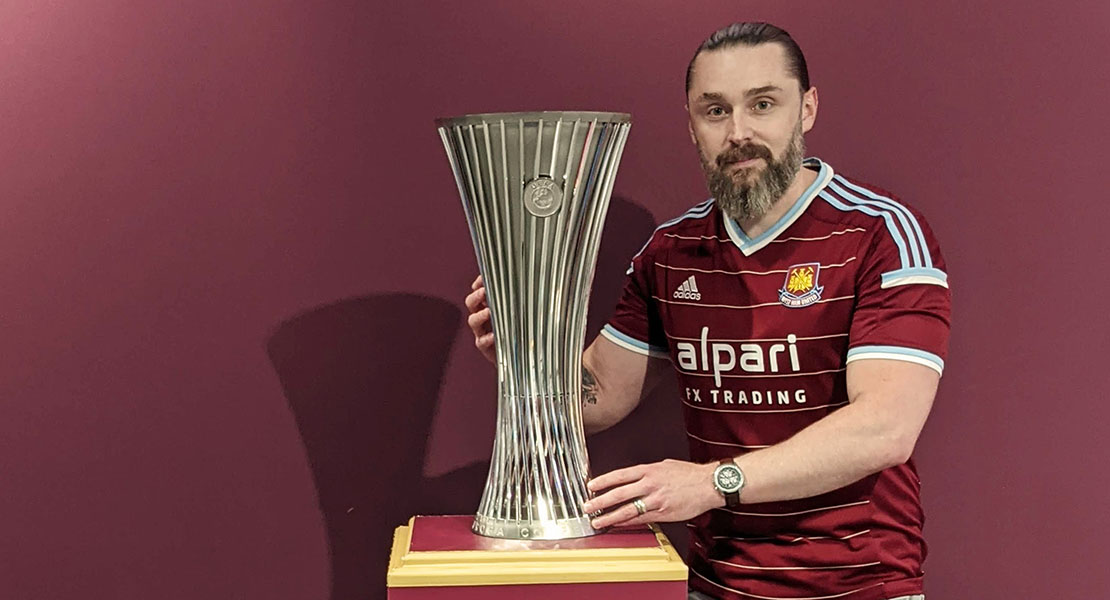
This story is adapted from an article originally written on 14 June 2023
Avid football fan Jordan Downes is actively celebrating his team’s recent trophy victory, but just over a year ago, his health was failing badly after a shock diagnosis of type 1 diabetes.
Whilst he revels in West Ham’s Europa Conference League win, it’s hard to believe that the fit and healthy 44-year-old has had to bounce back from the sudden and life-threatening symptoms he began experiencing in December 2021.
Jordan has always followed a healthy lifestyle. Alongside eating well, he attends the gym daily and is a qualified yoga instructor. It was a surprise then, when he began to feel unwell and it was soon followed by bouts of badly blurred vision.
He explains: “It was just after Christmas in 2021, when I started experiencing tiredness and began to feel unwell. I was really thirsty too, so at first I put it down to the Christmas excesses and assumed I’d let myself get dehydrated. My vision then started blurring as well, but I assumed it was because my eyes were too dry. In retrospect, I can see these were classic symptoms of diabetes.”
“I began drinking more and more water, but when I realised one morning I’d got through six pints overnight, then I knew that something was wrong. My vision had got steadily worse and over just a few days I’d become quite unwell. I knew I had to get some help.”
Jordan sought advice from his GP, who tested his glucose levels and quickly diagnosed him as having type 1 diabetes. He was immediately admitted to hospital and placed on an insulin drip. He remained there for a week whilst his health gradually improved and he began to come to terms with his diagnosis.
After overcoming his initial shock, Jordan made it his personal project to find out as much as he could about his condition.
Jordan says: “I thought to myself ‘Well, I’m in this situation now. What’s the best thing I can do?’ So I decided to educate myself about it and started to read all the information and research I could find. My job is in analysis for business and I’m used to working with a lot of big data, so this was something positive I knew I could do.
“It was while I was in hospital reading about diabetes that I came across news of a research trial running at another hospital. It was for people who were newly diagnosed so I called them right away.”
The trial was investigating a new immunotherapy aimed at slowing the damage to insulin-producing cells in the pancreas. Jordan says: “The trial nurse I spoke to was amazing. She was very knowledgeable and discussed every aspect with me but there was no pressure to join. I was able to ask all the questions I wanted and I’d soon decided it was definitely something I wanted to do."
Within a week Jordan was enrolled on the trial and was delighted about participating.
He says: “I wasn’t sure if the research would benefit me, or someone else down the line but it felt good to know I was contributing to something.
“Being part of the trial benefitted me in other ways too. The research nurses were fantastic and really helped me learn how to manage my condition. I didn’t have any practical knowledge or experience but they taught me everything I needed to know.
“When I was first discharged, before the trial, I was struggling to make it around the supermarket. But with their guidance and expertise I was back at the gym and watching football again in a few weeks.”
Jordan was given a Dexcom monitor as part of the trial, to continuously track his glucose levels. The small device is inserted under the skin on his torso and contains a transmitter which sends information to his hand-held device.
It also links to an app which the research nurses can access, to keep an eye on Jordan’s health. If his levels move too far up or down, they call him to offer advice, which Jordan has found invaluable.
Participation in the trial involved injections of the trial drug every 2 weeks, for the first 3 months and a ‘booster’ injection at 6 months. In the first year there were also monthly checks which Jordan found reassuring.
Now, nearly 2 years on, Jordan is still thoroughly enjoying a happy, healthy and active life and is a whole-hearted advocate for the ‘win-win’ of research.
He says: “Getting involved in research helped me get my condition under control. The extra data has given me better insights that I can apply to my day to day life to keep my diabetes better controlled.
“I was told that the trial is a key cog in finding a cure for diabetes. Drugs like these could change everything in the future and it feels great to be involved and be a part of that.”
How you can get involved with research
Sign up to Be Part of Research to be contacted about a range of health and care research. Or check out our full list of studies to see if one is right for you.
And if taking part in a study doesn’t feel right at the moment there are other ways to get involved in research.




